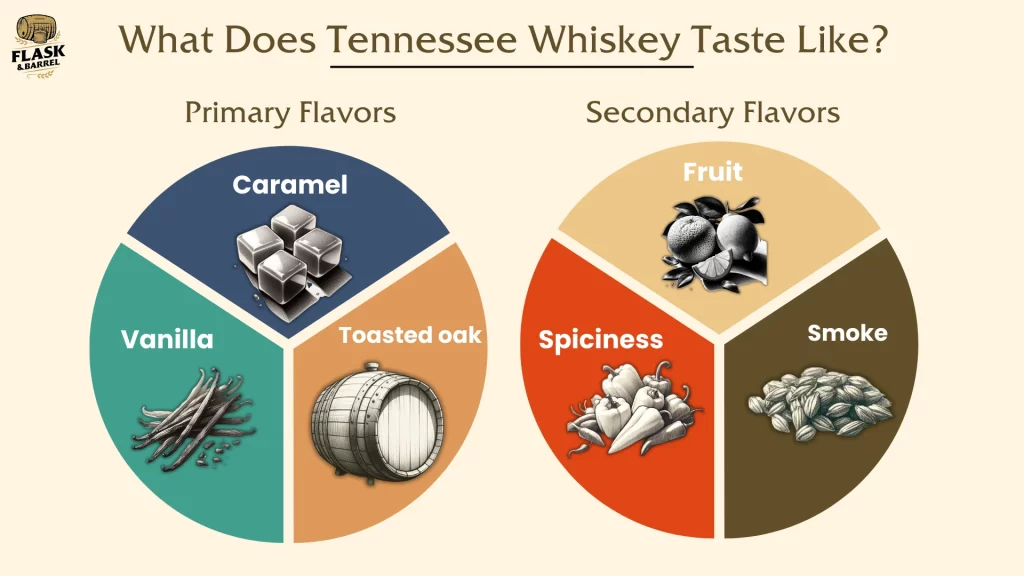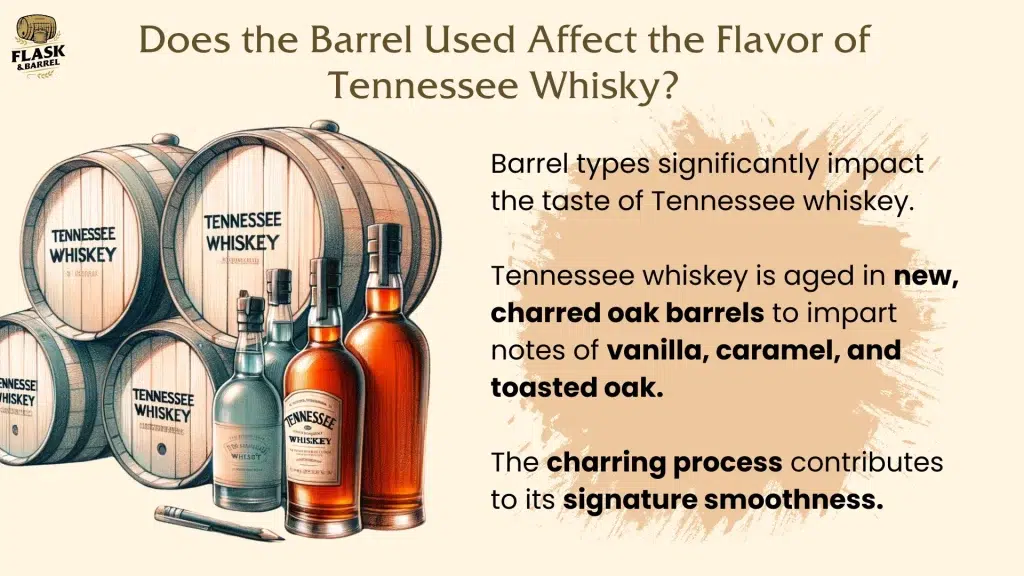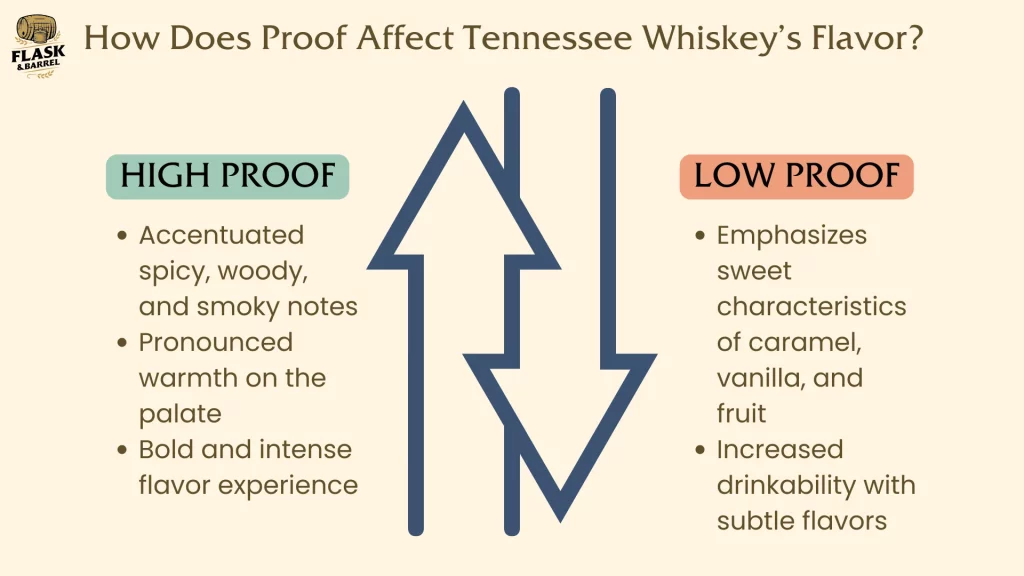Tennessee whiskey, often overshadowed by its Kentucky bourbon cousin, distinguishes itself with a unique blend of smoothness and a rich, smoky character. This distinctive identity positions Tennessee whiskey as a standout in the expansive whiskey universe, offering a taste experience that asserts its own category within the whiskey family. Prominent types of Tennessee whiskey include the traditional Straight Tennessee Whiskey and the more niche Tennessee Rye, each celebrated for their specific flavor profiles.
What Does Tennessee Whiskey Taste Like?
Tennessee Corn Whiskey also makes its mark, providing a sweeter, lighter alternative for enthusiasts. Delving deeper, each variety of Tennessee whiskey showcases a unique palette of flavors, influenced by distinct production methods, historical roots, and even suggestions for pairing with food. The ensuing sections will delve into these nuances, offering a comprehensive understanding of what makes Tennessee whiskey a revered spirit across the globe.

Tennessee whiskey tantalizes the palate with a harmonious blend of sweet, smoky, and charred flavors, setting it apart from other whiskey varieties. The primary flavors of this beloved spirit include rich caramel, vanilla, and toasted oak, stemming from its meticulous production process and aging in charred barrels. Secondary flavors often introduce hints of fruitiness, spice, and an underlying smokiness, attributed to the unique Tennessee charcoal mellowing process.
This intricate flavor profile not only makes Tennessee whiskey a pleasure to sip neat but also adds depth and complexity when mixed in cocktails. Understanding the impact of production nuances, barrel selection, and proof on the flavor can further enhance one’s appreciation of Tennessee whiskey, revealing why it holds a cherished place in the spirits world.
What are the Primary Flavors in Tennessee Whiskey?
The primary flavors that define Tennessee whiskey weave a rich tapestry of caramel, vanilla, and toasted oak. These flavors emerge directly from the whiskey’s aging process in charred oak barrels, imparting a deep, complex sweetness alongside a smooth, woodsy character. The charcoal mellowing process, a hallmark of Tennessee whiskey, further accentuates these flavors, ensuring a distinct smoothness and richness that sets it distinctly apart.
What are the Secondary Flavors in Tennessee Whiskey?
Beyond the primary notes, Tennessee whiskey unfolds a spectrum of secondary flavors that add intricate layers of complexity. These include fruity undertones like apple and pear, spice notes such as cinnamon and nutmeg, and a subtle smokiness that gently lingers on the palate. Originating from the specific grain bill, the meticulous distillation process, and the unique microclimate of the aging warehouse, these flavors contribute to the multifaceted and cherished flavor profile of Tennessee whiskey.
What Makes Tennessee Whiskey Taste Good?
The exceptional taste of Tennessee whiskey is the culmination of carefully selected ingredients, a unique production process, and the distinctive charcoal mellowing method known as the Lincoln County Process. The choice of grains, predominantly corn, imparts a foundational sweetness, while the limestone-filtered water used in the distillation process adds purity and a smooth texture. The aging process in newly charred oak barrels introduces deep notes of caramel, vanilla, and wood.
However, it’s the charcoal mellowing process that truly distinguishes Tennessee whiskey, smoothing out the flavors and integrating them into a harmonious, rich, and velvety spirit. This meticulous approach to whiskey-making ensures that each sip of Tennessee whiskey delivers a complex, satisfying taste experience.
How Does the Production Process Impact the Flavor of Tennessee Whiskey?
The production process of Tennessee whiskey significantly influences its flavor profile, beginning with the selection of grains that forms its base. The fermentation process, which transforms these grains into a mash, introduces initial flavor notes. However, it is the distillation process that concentrates these flavors, setting the stage for the whiskey’s character.
The defining step in Tennessee whiskey’s production is the Lincoln County Process, where the distilled spirit is filtered through sugar maple charcoal, mellowing the whiskey and imparting a smooth, distinctive taste. Finally, aging in new, charred oak barrels contributes to the complexity of the whiskey, adding layers of caramel, vanilla, and toasted oak flavors. Each step of this process is carefully controlled to ensure the final product delivers the rich, nuanced taste that Tennessee whiskey is celebrated for.
Does the Barrel Used Affect the Flavor of Tennessee Whisky?
Yes, the type of barrel used plays a crucial role in shaping the flavor profile of Tennessee whiskey. New, charred oak barrels are mandatory for aging Tennessee whiskey, imparting distinctive notes of caramel, vanilla, and toasted oak. The charring process of the barrels creates a layer of charcoal that acts as a filter, removing impurities and contributing to the whiskey’s smoothness.

Additionally, the interaction between the whiskey and the oak over time introduces a complex array of flavors, including subtle hints of spice and fruitiness. The choice of barrel, along with the length and conditions of the aging process, significantly influences the final taste, aroma, and color of Tennessee whiskey, making the barrel an indispensable factor in whiskey production.
How Does Proof Affect the Flavor of Tennessee Whiskey?
The proof of Tennessee whiskey, which indicates its alcohol content, significantly impacts its flavor profile. High proof whiskeys offer a more intense and robust flavor, with a pronounced warmth that emphasizes the spirit’s spicy and woody notes. Conversely, low proof whiskeys tend to be smoother and more mellow, allowing the sweeter and subtler flavors, such as caramel and vanilla, to shine through.
The proof is adjusted by adding water, which can either concentrate or dilute the array of flavors present in the whiskey. This adjustment is a critical step in the production process, as it balances the whiskey’s character, ensuring that the final product appeals to both connoisseurs and casual drinkers alike.

High Proof
High proof Tennessee whiskey, typically bottled at a higher alcohol by volume (ABV), delivers a bold and intense flavor experience. This elevated alcohol content accentuates the whiskey’s spicy, woody, and smoky notes, offering a rich and complex taste. The higher proof also brings a pronounced warmth on the palate, making it a favorite among those who appreciate a more robust whiskey character.
While the intensity of high proof whiskey can be powerful, it also allows for a deeper exploration of the spirit’s nuanced flavors, especially when enjoyed neat or with a minimal addition of water.
Low Proof
Low proof Tennessee whiskey, with its reduced alcohol content, is known for its smoother and more approachable flavor profile. This milder strength emphasizes the whiskey’s sweet characteristics, such as caramel, vanilla, and fruity undertones, making it particularly appealing to those new to whiskey or those who prefer a gentler sipping experience. The lower alcohol level enhances the whiskey’s drinkability, allowing the subtle and delicate flavors to emerge, creating a well-rounded and enjoyable tasting experience.
Low proof whiskey is ideal for savoring slowly, on its own, or as a versatile base in cocktails, where its flavors can complement a wide range of mixers.
Does Mixing Tennessee Whiskey with Other Drinks Create New Flavors?
Mixing Tennessee whiskey with other drinks not only creates new flavors but also unlocks a world of cocktail possibilities. The inherent flavors of Tennessee whiskey—caramel, vanilla, and oak—blend harmoniously with a variety of mixers, from classic soda and ginger ale to more adventurous fruit juices and bitters, crafting unique taste experiences. This versatility allows bartenders and enthusiasts alike to experiment with different combinations, leading to the creation of both classic cocktails and innovative new drinks.
Whether it’s the smooth sweetness of a Whiskey Sour or the refreshing zest of a Whiskey Highball, the addition of other ingredients enhances the whiskey’s complexity, making each sip a new discovery.
Does Tennessee Whiskey Lose its Taste Over Time?
Tennessee whiskey, once bottled, maintains its taste over time, defying the common misconception that spirits age or mature in the bottle. Unlike wine, which can evolve in flavor after bottling, whiskey’s aging process halts once it is removed from the barrel and bottled. This means that a bottle of Tennessee whiskey will preserve its flavor profile—caramel, vanilla, toasted oak—as long as it is stored properly.
Ideal storage conditions include keeping the bottle upright to avoid contact between the whiskey and the cork, which can alter its taste, and storing it in a cool, dark place to prevent exposure to direct sunlight or fluctuating temperatures. Thus, a well-stored bottle of Tennessee whiskey can be enjoyed for years without a loss in quality or flavor, making it a timeless addition to any collection.
Does Adding Ice or Water to Tennessee Whiskey Improve its Taste?
Adding ice or water to Tennessee whiskey can indeed enhance its taste, depending on personal preference. The introduction of water can unlock new flavors and aromas by reducing the alcohol’s dominance, allowing the whiskey’s subtler notes, such as fruity and floral undertones, to emerge more prominently. This dilution can make the whiskey smoother and more palatable, especially for those who might find its full strength overwhelming.
Similarly, adding ice chills the whiskey, which can tame its alcohol bite and concentrate its flavors, offering a refreshing and slightly different tasting experience. However, the extent of improvement is subjective and varies from one individual to another, as it largely depends on one’s taste and the characteristics of the whiskey being consumed.
What Distilleries Make the Best-Tasting Tennessee Whiskey?
The landscape of Tennessee whiskey is marked by several distilleries renowned for producing some of the best Tennessee whiskey the world. Jack Daniel’s, perhaps the most iconic, has long been celebrated for its smooth, rich flavors and meticulous charcoal mellowing process. George Dickel is another notable name, offering a range of whiskeys that are praised for their exceptional balance and depth.

Newer to the scene but no less distinguished, Nelson’s Green Brier has quickly made a name for itself with innovative blends that honor traditional Tennessee whiskey flavors while introducing modern twists. Each distillery has its unique approach to whiskey-making, from the selection of grains to the intricacies of the aging process, contributing to the diverse and rich flavor profiles that Tennessee whiskey enthusiasts have come to love and expect.
How Does the Taste of Tennessee Whiskey Compare to Other Spirits?
Tennessee whiskey stands out in the world of spirits with its distinctive taste profile, shaped by unique production methods and strict regulations. Compared to bourbon, Tennessee whiskey often has a smoother, mellower flavor due to the Lincoln County Process, which filters the spirit through sugar maple charcoal. This results in a less spicy and more harmonious character.
When contrasted with Scotch whisky, Tennessee whiskey offers a sweeter, less peaty experience, appealing to those who prefer a less smoky spirit. Against Japanese whiskey, which is known for its precision and balance, Tennessee whiskey brings a bolder, more robust flavor profile, with pronounced notes of caramel, vanilla, and oak. Each spirit has its own appeal, but Tennessee whiskey’s rich, smooth, and complex taste ensures it holds a revered place among whiskey aficionados and casual drinkers alike.

Tennessee Whiskey vs. Bourbon
Tennessee whiskey and bourbon share many similarities, as both are primarily made from corn and aged in new, charred oak barrels. However, the key distinction lies in the Lincoln County Process, a step exclusive to Tennessee whiskey where the spirit is filtered through sugar maple charcoal before aging. This process imparts a smoother, mellower character to Tennessee whiskey, distinguishing its flavor profile from bourbon, which tends to have a bolder, sweeter taste with more pronounced notes of vanilla and caramel due to the absence of charcoal mellowing.
Tennessee Whiskey vs. Scotch
The comparison between Tennessee whiskey and Scotch reveals a stark contrast in flavor profiles. Scotch, particularly single malt Scotch, is known for its smoky, peaty characteristics, a result of the malt drying process over peat fires. In contrast, Tennessee whiskey, with its charcoal mellowing process, offers a smoother, sweeter experience with prominent flavors of caramel, vanilla, and oak.
The geographical influence also plays a role, with Scotch embodying the essence of its Scottish origins, while Tennessee whiskey reflects the traditions and tastes of the American South.
Tennessee Whiskey vs. Japanese Whiskey
Tennessee whiskey and Japanese whiskey represent two distinct whiskey-making philosophies. Japanese whiskey, influenced by the Scottish tradition, often emphasizes balance, subtlety, and precision in its flavor profile. It can range from light and floral to peaty and complex, depending on the distillery’s style.
Tennessee whiskey, on the other hand, is characterized by its boldness, with a rich array of flavors including caramel, vanilla, and toasted oak, brought forth by the unique charcoal mellowing process. While both whiskeys offer complexity and depth, their differences in production methods and flavor emphasis provide a diverse tasting experience for whiskey enthusiasts.
What is the Best Way to Drink Tennessee Whiskey to Get the Best Taste?
If you’re just learning how to drink Tennessee whiskey, the best way to appreciate its rich flavor profile is to drink it neat or with a small splash of water. Drinking it neat, at room temperature, allows the intricate flavors and aromas—caramel, vanilla, and oak—to be experienced in their purest form. Adding a few drops of water can open up the whiskey, releasing more of its complex flavors and reducing the alcohol’s intensity for a smoother taste.
For those who prefer a chilled drink without dilution, using a whiskey stone instead of ice can cool the whiskey while preserving its full flavor. Ultimately, the best way to drink Tennessee whiskey depends on personal preference, but starting neat or with water can provide a solid foundation for exploring and enjoying the spirit’s depth and nuances.





